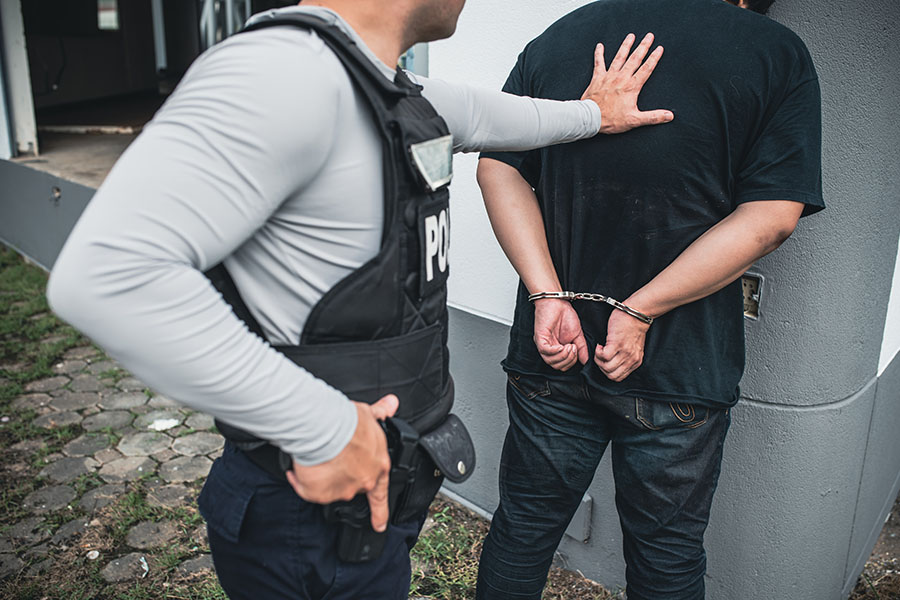Can I Sue Police for Excessive Force? Simply put, you can sue a police officer for excessive force. You may even have a case against the law enforcement agency or the municipality itself. However, sufficiently proving that an officer used excessive force can be a difficult legal challenge. Excessive force cases tend to require a high burden of proof, and law enforcement officers have certain legal protections that other citizens do not.
If you or a family member have been a victim of police misconduct we recommend that you consult a civil rights attorney as soon as possible. They will be able to guide you through filing a civil lawsuit, giving you the best chance at receiving compensation.
What is “Excessive Force”?
A police officer is permitted to use force, even deadly force, to make an arrest or defend themself. Typically, this use of force must be proportional to the threat at hand.
For example, an officer can use deadly force in the face of a credible threat to their life or serious bodily harm. Officers are also allowed to use force when dealing with a non-compliant suspect to make an arrest. What an office cannot do is use excessive force.
So what constitutes excessive force? Excessive force is defined as more physical force than would reasonably be necessary for a specific situation based on probable cause. This means that the arresting officers knowingly used a disproportionately high amount of force, thus committing an act of police brutality and violating a person’s Constitutional rights.
In police excessive force cases, the victim typically sustains serious injuries. However, even if you did not get seriously injured, you may still have a case. The key component is proving that the officers could have accomplished the same goal with less force.
Making a Case Against the Police for Excessive Force
By using excessive force, the officer has violated your rights guaranteed by the Fourth Amendment. The Fourth Amendment protects citizens of the United States from unreasonable searches and seizures.
The Civil Rights Act of 1871 is often the basis for attributing personal responsibility to the involved officers. This act attaches personal liability to anyone “acting under color” of State law to violate the constitutional rights of another. This means the officers can be held personally responsible to pay damages, with no reimbursement from the State or municipality.
Relevant Facts for Determining Excessive Force
Even though police officers can be held personally responsible for their actions, proving excessive force occurred depends on many factors. Some of the most important questions of your case include:
- Could the officer have accomplished the same goal with less force?
- Did you pose an immediate threat to the officers present?
- Would the police have reason to believe that you were armed?
- Did you resist arrest or attempt to flee?
- Were you committing a felony or misdemeanor?
- Did the officer act contrary to the established procedures of the police department?
- Were you restrained when you sustained injuries?
Burdens of Proof
In a civil lawsuit, it is typically the responsibility of the plaintiff to satisfy the burden of proof. This means it will be up to you and your legal team to provide sufficient evidence that the excessive force occurred. What qualifies as sufficient evidence will vary from state to state.
Many states use a “preponderance of the evidence” as the standard of proof, requiring you to prove that something more likely than not happened. Other stricter states may require “clear and convincing evidence”. This is a higher burden of proof that will require you to prove that it is substantially more likely that something did happen as opposed to didn’t happen.
Satisfying the burden of proof in an excessive force case can be difficult. Due to the complexities and relatively high standards, it’s in your best interest to hire an attorney to work on your behalf.
The Legal Protections of Police Officers
A common hurdle in excessive force cases is qualified immunity. Qualified immunity, as established by the Supreme Court, offers government officials significant legal protection when carrying out their official duties.
Overcoming qualified immunity requires proving that the officer violated your rights in a way that is clearly established in existing case law. Essentially, this means you must be able to prove that a previous case regarding nearly identical circumstances was ruled in favor of the plaintiff. While this presents a significant challenge, it’s not impossible.
Victims of Police Misconduct – Where to Start
Suffering injuries at the hands of the police can make you feel helpless and alone; and you might be wondering: “can i sue police for excessive force?”. The burden of proof for excessive force is relatively high, and suing the police may seem like an impossible task. That’s why Strickland & Kendall are dedicated to helping people in your situation.
If you feel that you, or a loved one, have suffered from excessive force you must consult an expert civil rights attorney with Strickland and Kendall, LLC, to help validate your claim and guide you forward in the process. Reach out to our team for a free legal consultation to discuss your claim 24/7, seven days a week at (800) 874-3528.
